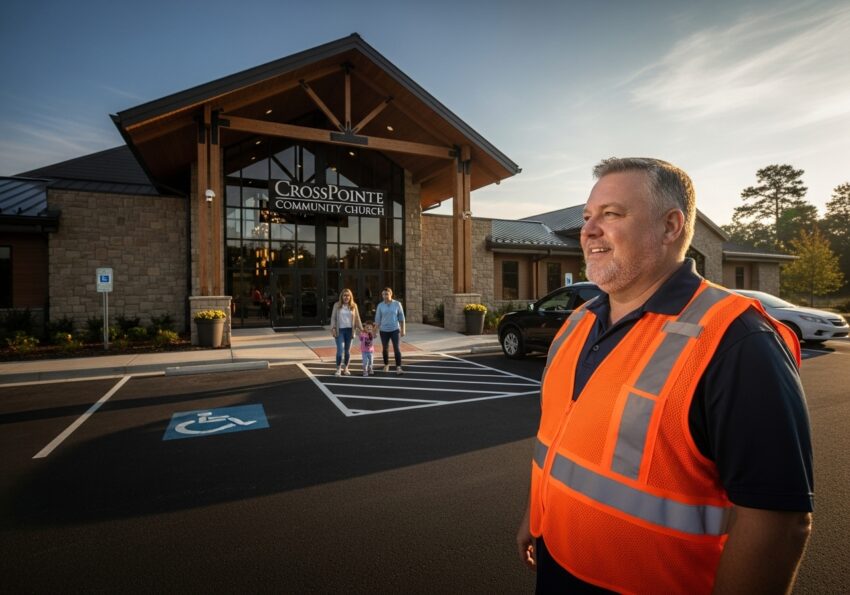The recent shooting at CrossPointe Community Church in Wayne, Michigan serves as a stark reminder that places of worship are far from immune to the violence we’re seeing across America today. This tragic incident, fortunately stopped by vigilant church members, highlights a fundamental truth conservatives have long recognized: the best defense against evil is a prepared, capable citizenry, ready to defend their own.
Ken Alexandrow, a veteran security expert who served 26 years with the Metro Nashville Police and participated in FBI-led anti-terrorism efforts, has laid out a clear, actionable strategy that any congregation can adopt to safeguard their place of worship. Alexandrow’s approach is not only practical—it’s rooted in conservative principles of self-reliance, preparedness, and community responsibility.
His approach revolves around a straightforward three-step method: deter, detect, and deny. The first step—deterrence—is as simple as it is powerful. Alexandrow recommends churches immediately establish what he calls a “first impressions ministry,” essentially a team of volunteers who meet and greet visitors in parking lots and at church entrances. This welcoming committee isn’t just about friendliness; it’s a strategic front line of defense. According to Alexandrow, potential assailants are psychologically deterred when they realize they’re already under watchful eyes from the moment they approach the church grounds.
Detection, the second step, emphasizes training church volunteers to become skilled observers, capable of recognizing suspicious behavior. Alexandrow stresses the importance of surveillance tools like cameras, but notes that technology alone is insufficient without trained individuals who know precisely what to look for. According to Alexandrow, “Do I have cameras? Do I have a camera operator? Are my people trained observers? Do they understand what to look for? That’s the detection part.”
Denying—the final step—is twofold. It begins with a realistic acknowledgment that violence can happen anywhere, even in sacred spaces. Churches must refuse the temptation of complacency. On a practical level, denial means establishing clear protocols and having trained responders—armed if necessary, medical teams, and emergency evacuation plans—to ensure that attackers cannot breach the sanctuary.
“If you did nothing else but create a ‘first impressions ministry,’ or a ‘parking lot ministry,’ have people greeting and welcoming your visitors and guests and looking for an anomaly, you win,” he said. “You’ve already started.”
Alexandrow emphasizes that volunteers don’t necessarily have to be armed; they simply need “the heart to serve.” He underscores how church safety ministries offer congregants an opportunity to serve their community meaningfully: “When I started training these churches and saying, ‘let’s start a safety ministry, which includes the parking lot, which includes medical, which includes an armed responder,’ now men and women say, ‘wait a minute, you mean there’s a place where I can serve, where I can get trained, the church pays for it, it makes me a better man, woman, husband, wife, and citizen, makes me safer at home and at church?’” Alexandrow explained.
Critically, Alexandrow warns against sending volunteers into harm’s way without proper preparation. “When you’re setting up these ministries, and you’re setting up your deterrence and your denial and your detection strategies, just remember: it’s great to have volunteers, but you have to equip them with the tools to do the job, or else you’re putting them in danger,” he cautioned.
Ultimately, these strategies represent something deeply conservative: taking responsibility into our own hands, protecting our communities, and trusting our instincts. Alexandrow makes it clear: “Listen to your intuition. If there’s a reason you paid attention to it and a reason you noted it, guess what? That’s an anomaly. And if you’re not comfortable investigating it further, make sure you tell somebody who is, and you can’t just let it go.”
CrossPointe Community Church’s swift action exemplifies the effectiveness of preparedness. As Police Chief Ryan Strong noted, the church security team’s rapid response prevented a potential tragedy. Alexandrow’s three-step approach—deter, detect, and deny—isn’t just theory; it’s a battle-tested blueprint that has now proven its worth in real-world situations.
Every church in America has both the right and responsibility to protect its congregants. Alexandrow’s method provides a clear path forward, empowering ordinary Americans to stand up against aggression and safeguard their sacred spaces. This is exactly the type of proactive, common-sense security measure we need, ensuring our churches remain sanctuaries of peace and worship, not targets of violence.
Click this link for the original source of this article.
Author: rachel
This content is courtesy of, and owned and copyrighted by, https://thebeardedpatriot.com and its author. This content is made available by use of the public RSS feed offered by the host site and is used for educational purposes only. If you are the author or represent the host site and would like this content removed now and in the future, please contact USSANews.com using the email address in the Contact page found in the website menu.








